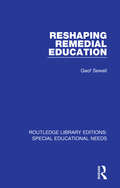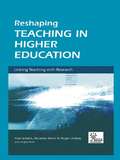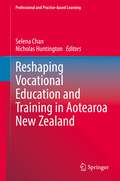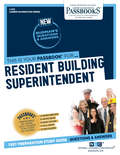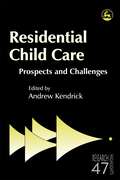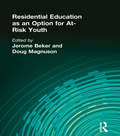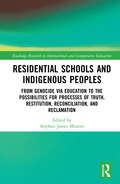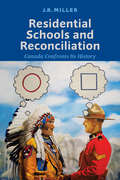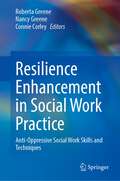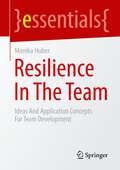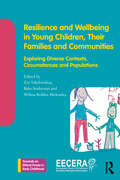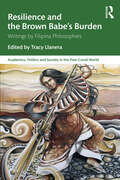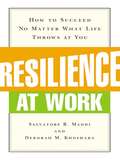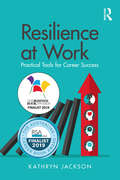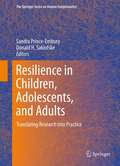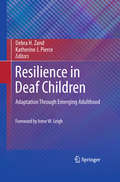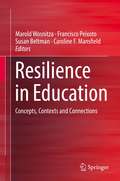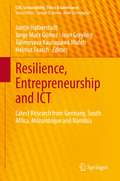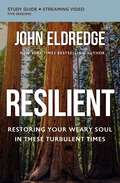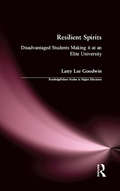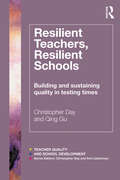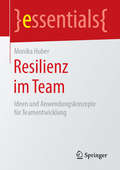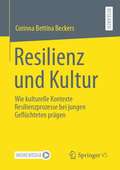- Table View
- List View
Reshaping Remedial Education (Routledge Library Editions: Special Educational Needs #50)
by Geof SewellFirst published in 1982. After the economic crises of the late seventies and early eighties, remedial education was affected particularly badly. Due to lack of funding, a child had to be labelled and diagnosed before they could receive any remedial education. For some children this labelling produced unintended and destructive consequences. The author examines this context of failure, and analyses various approaches to remedial education.
Reshaping Teaching in Higher Education: A Guide to Linking Teaching with Research (SEDA Series)
by Alan Jenkins Angela Brew Rosanna Breen Roger LindsayLinking research with teaching is one of the main topics in the educational development world. This practice based guide shows how academic research activity can be connected to academic teaching activity, to ensure that neither operates in a vacuum - and each can be enhanced by the other.Addressing issues at the individual, course and institutional level, and written for an international readership, this will be a key book for course leaders and educational developers.
Reshaping Vocational Education and Training in Aotearoa New Zealand (Professional and Practice-based Learning #34)
by Selena Chan Nicholas HuntingtonThis book contributes extensively to a better understanding of how vocational education and training (VET) and practice-based learning and teaching is developed and designed. It presents examples of vocational education as an ongoing dialogue, continually refreshed through engagement between educators and learners, Māori, employers, industry, and others. It demonstrates how the needs of learners can be met through relevant models of delivery, and how organisations and individuals work towards equity of access and parity of outcomes for all.It details the origins, purposes and evolution of vocational organisations, initiatives supporting Māori and Pasifika success and women in traditionally male-dominated occupations, the roles, provisioning and impact of foundation VET across different contexts, innovations through Certificate, Diploma and Degree programmes of learning, the contribution of new technologies to learning approaches, and the efficacy of education and professional development for VET teachers.This collection of chapters illustrates how Aotearoa New Zealand’s VET system is responding to challenging and changing environments through new frameworks of practice, approaches, and models of delivery. As an overview of a system in change, it is of interest to VET educators, system managers, and policy makers.
Resident Buildings Superintendent: Passbooks Study Guide (Career Examination Series)
by National Learning CorporationThe Resident Buildings Superintendent Passbook® prepares you for your test by allowing you to take practice exams in the subjects you need to study. It provides hundreds of questions and answers in the areas that will likely be covered on your upcoming exam.
Residential Carpentry: Student Guide Level 2
by Nccer StaffThe material in this textbook will help you prepare for a career in residential carpentry.
Residential Child Care: Prospects and Challenges
by Claire Cameron Christine Barter Brigid Daniel Jane Scott Harriet Ward Andrew Kendrick Ruth Emond Laura Steckley Malcolm Hill Jo Dixon Janet Boddy Lynne Hunter Kirsten Stalker Aileen Barclay Judy Furnivall Irene Stevens Joe Francis Roger Bullock Van Beinum Teresa O'NeillResidential Child Care draws on the latest research to offer guidance for developing best practice, policy and improved outcomes for children and young people. Contributors examine important aspects of residential care work, and address the concerns about the poor outcomes for young people leaving care and the role of residential child care as a positive choice within the range of care services. Key issues addressed include promoting well-being and development for young people; tackling potential discrimination in residential policy and practice; responding to areas of discord in residential child care; and underpinning themes relating to residential child care, such as staff development and support. This book will provide essential reading for policy makers, managers and practitioners in residential care and the social services, and students in the field.
Residential Education as an Option for At-Risk Youth
by Jerome Beker Doug MagnusonResidential Education as an Option for At-Risk Youth explores recent residential programs in Israel, draws comparisons with their European counterparts, and recommends practical approaches for the revitalization of such programs in the United States. This volume refutes the conventional professional “wisdom” in the United States that residential group care programs for children and youth are intrinsically flawed and counterproductive. Instead, it delivers effective models for the implementation of effective residential services. The editors and authors demonstrate the growing need for residential programs, given the overburdened family foster care resources, swelling numbers of “zero-parent” families, and homeless youth. Though the United States helped launch and develop residential services in Europe in the aftermath of World War II and has produced many excellent thinkers in the domain of quality residential group care, American programs have languished in recent decades. This book is designed to accelerate and facilitate progress in revamping and establishing excellent residential group care. The authors examine residential education as a developmentally based alternative to the more clinically and correctionally oriented programs for marginal children and youth dominating this field in the United States.The authors present their material in the context of appropriate theoretical principles, yet in practical ways that will permit program developers and managers to implement it effectively. Some of the specific areas chapters discuss are: exemplary Israeli programs as observed by visiting American professional in social work and allied fields important program variables and the cultural influences that may affect them African American experience for such programs a conceptual model for building successful residential education programs key organizational and management considerationsResidential Education as an Option for At-Risk Youth serves as a vital resource for ambitious program developers and managers wishing to reconceptualize and enrich their programs. It will also benefit advanced students, practitioners, and decision makers who have had, heretofore, few resources to rely on when seeking to promote more effective programs for socially marginal children and youth.
Residential Hydronic Heating: Installation & Design (I=B=R Guide RHH)
by Air Conditioning Heating Refrigeration InstituteI=B=R Guide RHH, "Residential Hydronic Heating Installation & Design Guide," provides general information on the application and installation of hydronic water and steam systems for residential heating.
Residential Schools and Indigenous Peoples: From Genocide via Education to the Possibilities for Processes of Truth, Restitution, Reconciliation, and Reclamation (Routledge Research in International and Comparative Education)
by Stephen James MintonResidential Schools and Indigenous Peoples provides an extended multi-country focus on the transnational phenomenon of genocide of Indigenous peoples through residential schooling. It analyses how such abusive systems were legitimised and positioned as benevolent during the late nineteenth century and examines Indigenous and non-Indigenous agency in the possibilities for process of truth, restitution, reconciliation, and reclamation. The book examines the immediate and legacy effects that residential schooling had on Indigenous children who were removed from their families and communities in order to be ‘educated’ away from their ‘savage’ backgrounds, into the ‘civilised’ ways of the colonising societies. It brings together Indigenous and non-Indigenous authors from Aotearoa/New Zealand, Australia, Greenland, Ireland, Norway, the United Kingdom, and the United States in telling the stories of what happened to Indigenous peoples as a result of the interring of Indigenous children in residential schools. This unique book will appeal to academics, researchers, and postgraduate students in the fields of Indigenous studies, the history of education and comparative education.
Residential Schools and Reconciliation: Canada Confronts Its History
by J. R. MillerSince the 1980s successive Canadian institutions, including the federal government and Christian churches, have attempted to grapple with the malignant legacy of residential schooling, including official apologies, the Royal Commission on Aboriginal Peoples, the Indian Residential Schools Settlement Agreement, and the Truth and Reconciliation Commission (TRC). In Residential Schools and Reconciliation, award winning author J. R. Miller tackles and explains these institutional responses to Canada’s residential school legacy. Analysing archival material and interviews with former students, politicians, bureaucrats, church officials, and the Chief Commissioner of the TRC, Miller reveals a major obstacle to achieving reconciliation – the inability of Canadians at large to overcome their flawed, overly positive understanding of their country’s history. This unique, timely, and provocative work asks Canadians to accept that the root of the problem was Canadians like them in the past who acquiesced to aggressively assimilative policies.
Resilience Enhancement in Social Work Practice: Anti-Oppressive Social Work Skills and Techniques
by Nancy Greene Roberta Greene Connie CorleyAs people around the globe experience more civil unrest and environmental disruption, the difficulties social workers face in their practice are becoming increasingly complex. This textbook deepens and expands the resilience-enhancing stress model (RESM) skill set and techniques so that social workers can more effectively serve clients and constituencies who are trying to overcome the stress of difficult life transitions and challenging environmental demands. It is designed as a companion piece to A Resilience-Enhancing Stress Model: A Social Work Multisystemic Practice Approach (Springer, 2022). The intent of the RESM is to further expand social workers' practice skill sets with additional concepts from the anti-oppressive practice (AOP) and coaching literature that aligns with the Educational Policy and Accreditation Standards from the Council on Social Work Education (CSWE). The book's 12 chapters are organized around life transitions and illustrate skills, techniques, and interviews important to the enhancement of resilience. Among the topics covered:The Resilience-Enhancing Stress Model: Articulating Anti-Oppressive PracticeExploring the Role of Cultural Diversity in Resilient Social Functioning: Theory and SkillsCountering Human Rights Violations During Life TransitionsFacilitating Community Development Following DisruptionResilience Enhancement in Social Work Practice: Anti-Oppressive Social Work Skills and Techniques uniquely offers practitioners a knowledge base to exponentiate their efficacy in identifying and fortifying resilience in a time in history when it appears to be imperative. It is written for a student social work audience at the generalist or advanced generalist level for practice across a range of populations and settings. It contains traditional and contemporary human behavior content that supports a social work narrative methodology and a life course perspective. It could be taught with its predecessor across one or two semesters. Practitioners in the field who are new to this content could also find the text a valuable resource.
Resilience In The Team: Ideas And Application Concepts For Team Development (essentials)
by Monika HuberThis essential provides insights into approaches, procedures and ideas on how resilience, understood as resistance, can be promoted and implemented in a team. Most of the time, these concepts are only applied to individuals. But many of the findings from resilience research can be transferred to teams and even extended. Today, resilience is also playing an increasingly important role in teams: whether it is to strengthen the sense of coherence according to Antonovsky's principle of salutogenesis, or to consider other resilience factors that support team capability
Resilience and Wellbeing in Young Children, Their Families and Communities: Exploring Diverse Contexts, Circumstances and Populations (Towards an Ethical Praxis in Early Childhood)
by Babs Anderson Wilma Robles-Melendez Zoi NikiforidouResilience and Wellbeing in Young Children, Their Families and Communities unpicks the theme of resilience and wellbeing through diverse contexts, circumstances, populations and life stories in order to explore its complexity globally.Current societal events have brought forward a need for understanding how to best support and create environments with conditions that promote children’s holistic wellbeing. Violence in all its facets, poverty, political conflict and the recent pandemic are among the major realities threatening children, and this demands attention to how resilience can be supported to effectively safeguard children’s lived experiences. This book explores resilience from a range of perspectives, research projects and practical support mechanisms for young children, families, educators and communities. It starts with theoretical conceptualizations and goes on to present specific research projects and applied initiatives and how these can be used in application to praxis for young children and their families.Being of interest to educators and human services striving to advocate for and enhance young children’s wellbeing, this book will serve as both a useful overview of the many approaches to supporting resilience in young children, while providing a sound theoretical perspective that is accessible for all.
Resilience and the Brown Babe’s Burden: Writings by Filipina Philosophers (Academics, Politics and Society in the Post-Covid World)
by Tracy LlaneraThis volume examines the concept and practice of resilience from the perspective of Filipina philosophers. It investigates the double-edged nature of resilience and other key assumptions and ideas about human resilience and resilient cultures and institutions. The chapters in the collection are intersectional in approach, drawing from feminist theory, social and political philosophy, critical theory, pragmatism, virtue theory, social epistemology, and decolonial theory in their engagement of the theme. Part of the Academics, Politics and Society in the Post-Covid World series, the book will be of interest to scholars and students of philosophy, political theory, feminist theory, philosophy of education, cultural studies, and development studies. It will be valuable to academics in Philippine Studies, Asian and Southeast Asian Studies, and Global South Studies.
Resilience at Work: How to Succeed No Matter What Life Throws at You
by Salvatore R. MADDI Deborah M. KHOSHABAThis useful resource gives you the knowledge, tools, and encouragement you need to embark on your journey to becoming a hardier, more successful person. More than experience or training, resilience in the face of stressful situations and rapid changes determines whether you ultimately succeed or fail in the workplace. It allows you to thrive even in tumultuous conditions, to turn potential disasters into growth opportunities. The good news for the legions of other workers who become overwhelmed by stress is that resilience in the face of life&’s problems is not an inborn personality trait, but a set of skills and attitudes that you can learn and develop.Packed with insightful examples, case studies, and self-assessment tools, Resilience at Work explains how to:Approach change as a meaningful challenge no matter how stressful the circumstances, and stay committed to your work, rather than detaching and giving up.Gain control by understanding the upside and the downside of change, and take actions to influence beneficial outcomes.Turn stressful changes to your advantage and map out sound problem-solving strategies.Resolve ongoing conflicts and build an environment of assistance and encouragement between you and your coworkers.Decrease feelings of isolation and powerlessness by understanding the 3Cs that give you the ability to thrive amid disruptive changes: commitment, control, and challenge.Reorganization, downsizing, mergers, budget pressures, transfers, job insecurity, and more are producing today&’s unpredictable, pressure-cooker conditions, and making it harder for less resilient people to achieve the success they deserve. Resilience at Work supplies insights and strategies you can use to combat your fear of change and uncover the opportunities that can be found in even the most stressful situations.
Resilience at Work: Practical Tools for Career Success
by Kathryn JacksonShortlisted for the 2019 Business Book Awards in the International Business Book category The world of work is in a constant state of flux. Resilience at Work: Practical Tools for Career Success is an essential guide to maintaining resilience in this ever-changing environment, whether you are working in a turbulent field, navigating the job market or simply trying to realise your career ambitions. Based on the author’s own experience of working under extreme circumstances in post-earthquake Christchurch, New Zealand and enhanced by collaboration with leading resilience experts from around the world, this book is packed with stories, resources and personal coaching to support you to: learn about the importance of emotional honesty as a foundation for true resilience explore how your levels of self-care influence your ability to re-energise and stay strong consider how having the right sort of connections play a part in your ability to flourish reflect on how you have been learning (and changing) along your journey to resilience This is an invaluable resource for organisations looking to support employees by giving them the tools for self-managed resilience at work. It is also ideal for career coaches, counsellors and other professionals who are working with clients facing their own crisis of resilience, whether they are starting out or well-advanced on their career journey. Kathryn Jackson’s unique coaching style enables readers to truly personalise the approach they choose to take, using the stories, the frameworks and the research to create a unique voyage towards building Resilience at Work.
Resilience in Children, Adolescents, and Adults
by Donald H. Saklofske Sandra Prince-EmburyResilience in Children, Adolescents, and Adults: Translating Research into Practice recognizes the growing need to strengthen the links between theory, assessment, interventions, and outcomes to give resilience a stronger empirical base, resulting in more effective interventions and strength-enhancing practice. This comprehensive volume clarifies core constructs of resilience and links these definitions to effective assessment. Leading researchers and clinicians examine effective scales, questionnaires, and other evaluative tools as well as instructive studies on cultural considerations in resilience, resilience in the context of disaster, and age-appropriate interventions. Key coverage addresses diverse approaches and applications in multiple areas across the lifespan. Among the subject areas covered are: - Perceived self-efficacy and its relationship to resilience. - Resilience and mental health promotion in the schools. - Resilience in childhood disorders. - Critical resources for recovering from stress. - Diversity, ecological, and lifespan issues in resilience. - Exploring resilience through the lens of core self-evaluation. Resilience in Children, Adolescents, and Adults is an important resource for researchers, clinicians and allied professionals, and graduate students in such fields as clinical child, school, and developmental psychology, child and adolescent psychiatry, education, counseling psychology, social work, and pediatrics.
Resilience in Deaf Children
by Katherine J. Pierce Debra H. Zand<P>Historically, the diagnosis of deafness in a child has been closely associated with profound disability, including such typical outcomes as unmet potential and a life of isolation. A major shift away from this negative view has led to improved prospects for deaf children. <P>Resilience in Deaf Children emphasizes not only the capability of deaf individuals to withstand adversity, but also their positive adaptation through interactions with parents, peers, school, and community. In this engaging volume, leading researchers and professionals pay particular attention to such issues as attachment, self-concept, and social competence, which are crucial to the development of all young people. In addition, the volume offers strategies for family members, professionals, and others for promoting the well-being of deaf children and youth. <P>Coverage includes: <br>Attachment formation among deaf infants and their primary caregivers.<br>Deaf parents as sources of positive development and resilience for deaf infants.<br>Enhancing resilience to mental health disorders in deaf school children.<br>Strength-based guidelines for improving the developmental environments of deaf children and youth.<br>Community cultural wealth and deaf adolescents' resilience.<br>Self-efficacy in the management of anticipated work-family conflict as a resilience factor among young deaf adults.<br>Resilience in Deaf Children is essential reading for researchers, clinicians, and graduate students in clinical child, school, and developmental psychology as well as for allied researchers and professionals in such disciplines as school counseling, occupational therapy, and social work.
Resilience in Education: Concepts, Contexts and Connections
by Marold Wosnitza Francisco Peixoto Susan Beltman Caroline F. MansfieldThis volume focuses on resilience in educational contexts which has emerged as an important field of research, with recent investigation into resilience of school students teachers, and post-secondary students and staff. The book integrates theoretically diverse viewpoints and research advancing relevant theory. It furthermore presents interventions which aim enhancing resilience in the educational context. The interplay between more basic research and actual practice in the classroom, university or workplace enriches relevant theory and research. Each chapter includes an explanation of how resilience is conceptualized in the research and the methods used to examine resilience. The chapters also provide a description of the context in which the research was conducted and how particular aspects of context influence the resilience process. Innovative approaches to exploring resilience are highlighted as well as directions for future research.
Resilience, Entrepreneurship and ICT: Latest Research from Germany, South Africa, Mozambique and Namibia (CSR, Sustainability, Ethics & Governance)
by Jorge Marx Gómez Jantje Halberstadt Jean Greyling Tulimevava Kaunapawa Mufeti Helmut FaaschThis book is based on the work of the YEEES Research Centre, an international network of scientists from partner universities in Germany, Mozambique, Namibia and South Africa. It presents inter- and transdisciplinary research that explores different ways of understanding resilience, an essential characteristic for systems, organizations and people – providing them with strength in the face of attacks and challenges, and both enabling and fostering constant adaptation and improvement. Building resilience to face today’s ever-changing societal and environmental realities requires unbiased research activities that transcend the borders of countries and academic disciplines alike. The research addressed in this book, thus, is multidisciplinary and includes contributions to areas such as sustainable agriculture, entrepreneurial ecosystems, and smart communities, as well as groundbreaking work on skills development and ICT education. Highlighting the variety of research activities and their outcomes, this book offers a valuable resource for researchers and practitioners in the fields of sustainable resilience development.
Resilient Bible Study Guide plus Streaming Video: Restoring Your Weary Soul in These Turbulent Times
by John EldredgeA ROAD MAP TO FINDING THE JOY YOU&’VE LOSTThe longing for joy is one of the deepest yearnings of the human heart. After times of trial—including the pandemic, economic turmoil, wars and rumors of war, and grief— our desire rises to the surface demanding relief. We&’ve had to rally. Yet at some point, we have to replenish our soul&’s reserves or we will burn out.In this Resilient study series, John Eldredge provides the awareness and skills you need to strengthen your weary soul. Drawing on wisdom from Scripture, Christian tradition, and practical experiences, Resilient offers powerful supernatural graces to sustain you through these trying times as well as prepare you for future storms. Resilient leads you to the peace only God can give in a world gone mad—and helps you receive from Jesus the strength that prevails.This study guide includes:Individual access to five streaming video sessionsA guide to best practices for leading a groupVideo notes and a comprehensive structure for group discussion timePersonal study for deeper reflection between sessionsSessions and video run times:The Strength That Prevails (17:30)Glory or Desolation (21:00)Unconverted Places (19:30)The Deep Well Inside Us (22:30)Don&’t Look Back (26:30)This study guide has everything you need for a full Bible study experience, including:The study guide itself—with discussion and reflection questions, video notes, and a leader's guide.An individual access code to stream all video sessions online. (You don&’t need to buy a DVD!)Streaming video access code included. Access code subject to expiration after 12/31/2027. Code may be redeemed only by the recipient of this package. Code may not be transferred or sold separately from this package. Internet connection required. Void where prohibited, taxed, or restricted by law. Additional offer details inside.
Resilient Spirits: Disadvantaged Students Making it at an Elite University (RoutledgeFalmer Studies in Higher Education)
by Latty Lee GoodwinThis study explores the identity construction of socioeconomically and educationally disadvantaged students who enter an elite university. This critical ethnography gathered qualitative data about the twenty-three participants through non-participant observation, in-depth interviews, and focus groups. Faculty, staff, and administrators were also interviewed.
Resilient Teachers, Resilient Schools: Building and sustaining quality in testing times (Teacher Quality and School Development)
by Christopher Day Qing GuThis book unpicks the complex, dynamic blend of individuals’ psychological and professional assets, workplace conditions and leadership support which enable teachers who stay in teaching to continue to make a difference in their careers, regardless of shifts in policy, workplace, professional and personal circumstances. Whilst much has been written over the years about teacher stress and burnout, there is very little research which reports on the conditions which are essential for teachers to sustain their commitment and effectiveness over their professional lives, in contexts of challenge and change. Drawing upon a range of educational, psychological, socio-cultural and neuro-scientific research, together with vivid accounts from teachers in a variety of primary and secondary schools internationally, and from their own research on teachers’ work and identities, the authors discuss the dynamic nature, forms and practices of teacher resilience. They argue that resilience in teachers is not only their ability to bounce back in extremely adverse circumstances but that it is the capacity of teachers for everyday resilience which enables them to sustain their commitment and effectiveness in responding positively to the unavoidable uncertainties inherent of their professional lives. The authors conclude that resilience in teachers can be nurtured by the intellectual, social and organisational environments in which teachers work and live, rather than being simply a personal attribute or trait, determined by nature. Resilient Teachers, Resilient Schools will be of key interest to policy makers, head teachers, teachers and training and development organisations who wish to improve quality and standards in schools.
Resilienz im Team: Ideen und Anwendungskonzepte für Teamentwicklung (essentials)
by Monika HuberDieses essential gibt Einblicke in Ansätze, Vorgehensweisen und Ideen, wie sich Resilienz, verstanden als Widerstandskraft, im Team fördern und umsetzen lässt. Meist werden diese Konzepte nur auf Einzelpersonen angewendet. Doch viele der Erkenntnisse aus der Resilienzforschung lassen sich auf Teams übertragen und sogar erweitern. So spielt Resilienz heute auch in Teams eine immer größere Rolle: Sei es, um das Kohärenzgefühl nach Antonovskys Prinzip der Salutogenese zu stärken, oder um andere Resilienzfaktoren in Betracht zu ziehen, die die Teamfähigkeit unterstützen.
Resilienz und Kultur: Wie kulturelle Kontexte Resilienzprozesse bei jungen Geflüchteten prägen
by Corinna Bettina BeckersDie Monographie analysiert das Verhältnis der wissenschaftlichen Konstrukte „Resilienz“ und „Kultur“ und postuliert auf Basis ihrer empirischen Befunde wichtige Interdependenzen im Sinne einer Cultural Resilience. Kulturelle Aspekte von Bewältigung wurden in mehr als 50 Jahren Resilienzforschung nur wenig beachtet. In Abgrenzung hiervon lässt sich die Masterarbeit einordnen in eine innovative Forschungswelle, die Resilienz als kulturell eingebettet definiert. Kulturelle Resilienz wird als basaler Referenzpunkt für Interventionsdesigns bewertet, die auf effektive Förderung der Resilienzfähigkeit (junger) Geflüchteter abzielen. Die qualitative Studie, die spätestens mit dem „Sommer der Migration“ 2015 von besonderer Relevanz für Sozialarbeitswissenschaft wie Praxis der Sozialen Arbeit ist, leistet so einen Beitrag zur Bearbeitung des Forschungsdesiderates zur kulturellen Kontextabhängigkeit von Resilienz
